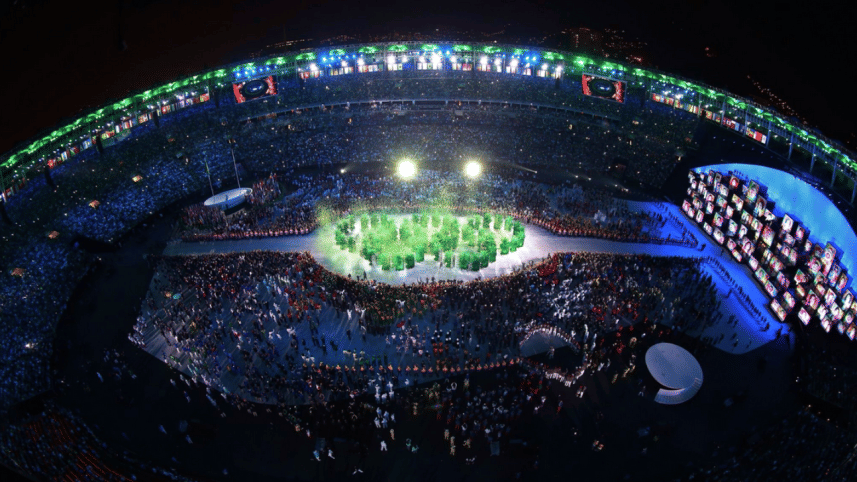Beating heart of Brazil's musical heritage reveals deeper message

A joyful sashay through Brazil's extraordinary musical heritage was infused with a social message and a warning over the dangers of climate change as Rio de Janeiro drew back the curtain of the 2016 Olympic Games with a highly charged opening ceremony.
"Past the risky point" is how creative director Fernando Meirelles described the state of the planet hours before the ceremony in the Maracana Stadium, and the Oscar-nominated director of City of God made good on his promise to urge the expected three billion-plus television audience to sit up and take action, reports the official website of Rio Olympic Games.
Giant, NASA-inspired heat maps showing the projected effect of sea-level rises on cities including Amsterdam, Shanghai and Rio de Janeiro were displayed, while the sight of smiling musical legends Gilberto Gil and Caetano Veleso delighted the watching thousands.
The Amazon featured heavily, with one section highlighting the birth of the world's biggest rainforest inducing gasps of delight as clouds of luminous yellow butterflies engulfed the iconic football stadium.
The celebration continued to be matched by Meirelles' message, with even the Olympic rings turning a lush green after the almost 11,000 parading athletes were each given a cartridge containing a seedling. Organisers have pledged that every tree will be transplanted to create an Athletes' Forest in Deodoro, site of the second-largest Rio 2016 venue cluster.
Areas of low-income housing were represented by wild urban beats and stark images of poverty. A city of contrasts, pop-funk sensation Ludmilla shared the stage with 1950s samba queen Elza Soares, before 12-year-old rapper MC Soffia picked up the baton and led 1500 residents of the Carnaval city into a rocking street party.
Many of Brazil's highest profile personalities made an appearance. Supermodel Gisele Bundchen, 36, marked what she has declared to be her last appearance on a catwalk in spectacular style, holding the stadium enraptured to Tom Jobim's iconic song The Girl from Ipanema. Compatriot Lea T, the first transgender model to sign a beauty contract, added to the insistent message of tolerance and diversity, carrying a placard in the Athletes' Parade.
The tones of acclaimed British actress Judi Dench were also heard, reading a classic Brazilian poem. As bizarre as that sounds, it somehow fitted the smile-inducing spectacle.
Two further moments of international focus stood out. First, the awarding of the newly inaugurated Olympic Laurel to two-time Olympic gold medallist athlete Kipchoge Keino, 76, recognising his work educating orphaned children, and the arrival of the Refugee Olympic Team to roars almost as deafening as those reserved for the home athletes.
In a fitting finale, it was Vanderlei Cordeiro de Lima, the marathon runner made famous for seeing his gold medal hopes dashed by a spectator who wrestled him to the ground during the latter stages of the Athens 2004 race, who lit the Olympic flame.
As predicted by Meirelles, Brazil's "heart" proved more than enough.
[twitter]
Made in #BRA - The #OpeningCeremony counted on the presence of various celebrities and athletes.https://t.co/kAIBQul2GM
Rio 2016 (@Rio2016_en) August 6, 2016
[/twitter]



Comments